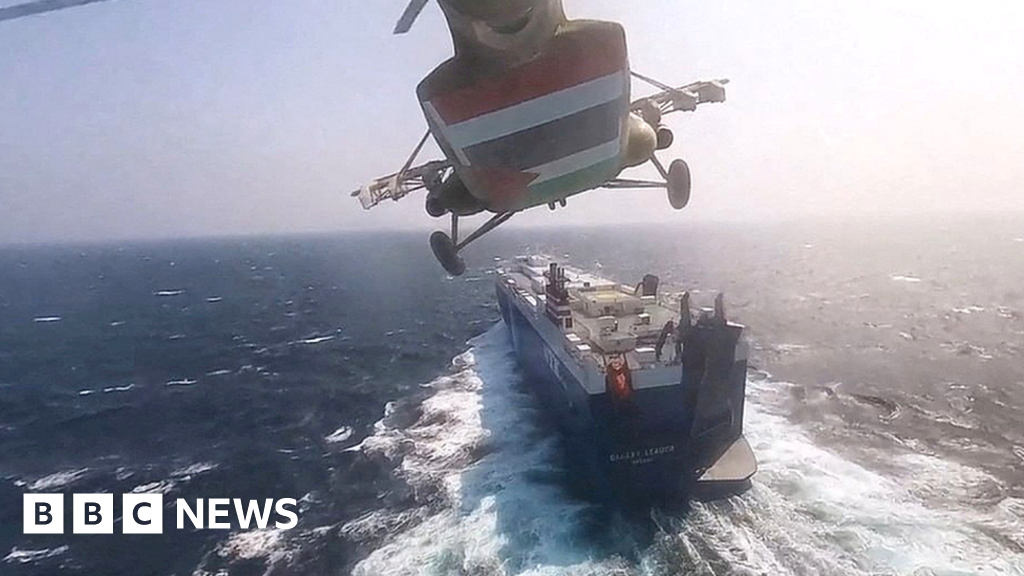- By Michael Race
- Business reporter, BBC News
Global supply chains are facing severe disruption as a result of the world’s biggest shipping companies diverting journeys away from the Red Sea.
Attacks by Houthis in Yemen on commercial vessels have resulted in many firms deciding to avoid one of the world’s busiest shipping lanes.
The Houthi group has declared its support for Hamas and has said it is targeting ships travelling to Israel, though it is not clear if all the ships that have been attacked were actually heading to Israel.
US and UK naval forces in the Red Sea have now launched air strikes against Houthi rebel targets in Yemen in response to the attacks on shipping.
What has happened?
The Houthis have been stepping up their attacks since the start of the Israel-Hamas war in October.
The group, which is backed by Iran, has been using drones and rockets against foreign-owned vessels transporting goods through the strait of Bab al-Mandab – a 20-mile wide channel that splits Eritrea and Djibouti on the African side and Yemen on the Arabian Peninsula.
Ships usually take this route from the south to reach Egypt’s Suez Canal further north.
But because of the attacks and the threat of future assaults, several of the world’s largest shipping firms, including Mediterranean Shipping Company and Maersk, have diverted vessels away to a much longer route around Africa’s Cape of Good Hope and then up the west side of the continent.
The longer journeys add at least 10 days to shipping times and cost companies millions of dollars.
Why is this shipping route so important?
Any ship passing through the Suez Canal to or from the Indian Ocean has to come via the strait of Bab al-Mandab and the Red Sea.
The Suez Canal is the quickest sea route between Asia and Europe and is particularly important in the transportation of oil and liquefied natural gas (LNG).
About nine million barrels of oil per day were shipped through the Suez Canal in the first half of 2023, according to freight analytics firm Vortexa.
Analysts at S&P Global Market Intelligence said nearly 15% of goods imported into Europe, the Middle East and North Africa were shipped from Asia and the Gulf by sea. That includes 21.5% of refined oil and more than 13% of crude oil.
But it is not just about oil. Container ships carry all sorts of consumer goods seen in the shops including TVs, clothes, trainers and sports equipment.
More on the US-UK strikes in Yemen
What is the impact on consumers?
It is inevitable that supply chains will be affected due to ships being diverted away from the Red Sea, but consumer goods “will face the largest impact”, according to Chris Rogers, head of supply chain research at S&P Global Market Intelligence, though he does note the current disruption has occurred “during the off-peak shipping season”.
Delays to products reaching shops can be expected, due to the Cape of Good Hope route adding about 3,500 nautical miles.
Furniture giant Ikea and UK retailer Next have both warned that supplies of products could be delayed if disruption to shipping continues.
Tesla has suspended manufacturing at its only European electric car factory due to supplies being disrupted.
The extra distance will also cost companies more. According to supply chain advisers Drewry, the price of using a 40ft container has risen by 15% in the past week. These extra costs could be passed on by businesses to customers.
However, container rates are still far below the levels seen in 2021, when freight charges soared in line with demand as Covid restrictions were eased.
There are also fears the disruption could push up oil prices.
A rise in oil prices, a key ingredient in car fuel, can lead to higher prices at the pumps and also drive higher inflation. Inflation, which measures the pace of price rises, has been falling in the UK and is currently 3.9%.
When it comes to shipments of Liquid Natural Gas (LNG) being disrupted, even if wholesale energy prices rise, any increases would not feed through to domestic bills until April 2024 at the earliest.
This is because the energy price cap, which limits the amount suppliers can charge, has already been set for January.
Is moving freight by sea the only option? Mr Rogers says transporting goods by rail instead would require “crossing Russia”, which is under economic sanctions due to invading Ukraine, while “trucking from the Gulf to Israel may only offset around 3% of shipping”.
What is being done in response?
The US had launched an international naval operation in December to try to protect ships on the Red Sea route.
This operation was joined by countries including the UK, Canada, France, Bahrain, Norway and Spain, but some shipping companies remained reluctant to start using the route again.
US and UK naval forces in the Red Sea have now launched air strikes against Houthi rebel targets across Yemen.
“These targeted strikes are a clear message that the United States and our partners will not tolerate attacks on our personnel or allow hostile actors to imperil freedom of navigation,” US President Joe Biden said.

